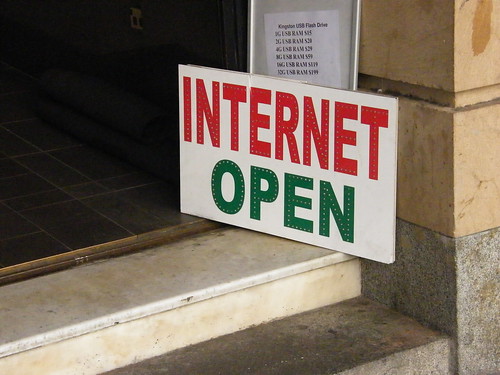
Photograph Credit: Blaise Alleyne. “The Internet was open in Brisbane, fortunately.” Creative Commons License: CC BY 2.0.
Having been involved with (and some would say, partially responsible for) encouraging Australian artists and organisations to maximise their online and social media presence and engagement, I feel that it is important for me to now voice some of the increasing doubts and concerns I have been professionally – and personally – struggling with in this area.
My journey with online media is a long one. I have been building and maintaining online communities since I first started working in media arts in 1996 – long before the social media platforms we now depend on existed. All ‘free’ tools need to make money somewhere, which they do largely through advertising and data-mining (turning your data into “the product” – as Douglas Rushkoff points out in his book “Program or be Programmed” – that they on-sell to commercial partners).
Having spent a decade hand-building my online community spaces, I felt Facebook and Twitter’s entry into the scene offered an acceptable exchange. In return for giving them my data (which I didn’t deem terribly valuable or important) I gained a set of tools that enabled me to communicate effectively with the community I needed to reach, quickly, openly and at no commercial price. I knew full well that in using these ‘free’ tools I was accepting a contract which made me “the product”, but I was OK with that. These days, I’m not so sure.
Paying to promote the popular
You might have noticed that Facebook isn’t the same as it used to be. Don’t worry, this isn’t some whinge about how the layout is different, again. I’m not complaining about change-in-general, I’m voicing concerns about the reasons behind the changes that are taking place and what this reflects about current trends in online and digital culture more broadly.
Your Facebook News Feed used to consist of a chronological list, where any post (whether a personal message, photo, meme or link from another website, regardless of whether that was from a personal profile, group or page) would appear in the order they were published. Of course the more friends you have, or the more groups or pages you follow, the more hectic and noisy your feed would be. Since August last year new changes mean that any post with a lot of likes or comments is bumped back up to the top of the list again, prioritising the ‘popular’.
From a personal perspective, you’re probably not seeing quite the same number of updates from as many of your Facebook friends as you used to (with the same applying to groups and pages that you follow). Where have they gone, you might ask?
From a professional perspective (if you run a Facebook page for your business), you’re probably finding that each post is receiving less views than they used to. As well as being able to buy advertising for your page as a whole, you now (coincidentally) are invited to ‘promote’ each post – paying for a boost, essentially advertising each post you make – to increase your potential audience.
Technically both of these shifts are due to last year’s changes in Facebook’s algorithm which (in their words) are intended to “deliver the right content to the right people at the right time so they don’t miss the stories that are important to them”. Let’s look at the changes they outline:
The News Feed algorithm responds to signals from you, including, for example:
How often you interact with the friend, Page, or public figure (like an actor or journalist) who posted
The number of likes, shares and comments a post receives from the world at large and from your friends in particular
How much you have interacted with this type of post in the past
Whether or not you and other people across Facebook are hiding or reporting a given post
What’s happening here is essentially the creation of a feedback loop, preventing you from seeing posts from people you don’t normally see (and here’s the catch22-clincher) because you don’t normally see them. You could try to counter that by actively going to the profiles/pages of people you want to hear more from, thereby setting the agenda for the way the new algorithm works with your preferences. But instead of making that easy for you or offering you that choice, they define it on your behalf. Even the least cynical amongst us should be concerned about how – and why – those pre-selections are made.
In this list we can also see the return of the old upvote ‘popularity contest’ so favoured by commercial channels. This assumes that if your friends like a post then obviously you will too, thereby further shrinking the visibility of any post which is more niche or hasn’t been commercially ‘promoted’.
My concerns with this are twofold:
- When you only see posts from the same people – and when everyone only sees the same few posts – you end up existing in an echo chamber, or “the digital flock” as MIT’s Ethan Zuckerman describes it. I love the diversity of conversations I have online as much as the random conversations with strangers I have on the street. What I feel I used to gain from social media was the added benefit of sometimes choosing to have those conversations within a more curated crowd. I don’t want to only have access to homogenised information streams – in fact I stopped watching television, reading newspapers and listening to radio a very long time ago for exactly that reason.
- If only ‘promoted’ posts reach your target audience, then eventually only those with marketing budgets will be heard.
Facebook aren’t the only ones moving in this direction; Twitter also went for IPO last year and accordingly are pushing a much greater prominence of sponsored posts. But in some ways these two were always expected to go down the revenue generation route; in internet terms they are but meagre children (ten and eight years old, respectively). What I find more disconcerting is the strategic shift taking place internationally across the internet as a whole.
The end of the open web

Photograph Credit: Nick J Webb. “This is for everyone” Tim Berners-Lee tweet displayed on LCD screens at the London Summer Olympics Opening Ceremony July 2012. Creative Commons License: CC BY 2.0.
In an article posted by Scientific American in 2010 entitled “Long Live the Web: A Call for Continued Open Standards and Neutrality” (ironically published behind a paywall), World Wide Web [WWW] inventor Tim Berners-Lee outlines the simple yet profound intention of his 1989 creation: “that any person could share information with anyone else, anywhere”. Reflecting on these early egalitarian principles and the thousands of people who contributed their time and efforts to this vast knowledge-bank infrastructure, Berners-Lee outlines contemporary threats posed by key players within the upper echelons of the corporate digital world.
Whether visibly or not, we will all have experienced these control mechanisms. Internet Service Providers [ISPs] have commonly set traffic speeds according to whether or not a commercial deal is in place between themselves and the destination site, under the guise of maintaining ‘quality bandwidth provision’ to their paying customers. Paywalls have become the familiar toll-gate to mainstream journalism and (often publicly funded) academic research. Walled gardens such as Facebook use the facade of ‘privacy’ to assert the ‘value’ of closed-networks – after all sharing is relative, right? But how much power should these commercial players be allowed to wield in preference to anyone else’s right to share their information with anyone else, anywhere?
This corporate desire to control ownership of the digital landscape is not a new story. We have all heard of the ‘dreadful losses’ incurred by the all-powerful (and largely US-based) music, film and TV behemoths. Many (including myself) believe that, instead of adapting their business models to take advantage of the multiple global market opportunities the internet provides, these players have instead chosen to bury their heads in the sand, mounting various forms of legislative attack in order to protect their own corporate interests. Since the Stop Online Piracy Act [SOPA] and Protect Intellectual Property Act [PIPA] failed to gain legislative approval following enormous public outcry, it’s hardly surprising that current Trans Pacific Partnership [TPP] negotiations – which cover far more than pure copyright concerns – are taking place behind closed-doors. It is not in the best interests of gatekeepers to let the general public become involved in such weighty decisions, after all.
The TPP is an international trade agreement which seeks to “enhance trade and investment among the TPP partner countries, promote innovation, economic growth and development, and support the creation and retention of jobs”. This all sounds pretty commendable, until you realise that its primary focus is to enhance the opportunities of the corporate American market through control over existing laws in member countries. A draft text of the Intellectual Property Rights Chapter released by WikiLeaks revealed that member Governments (including Australia) could be sued for foreign corporations’ loss of future profits when making laws in the public interest; be prevented from offering generic-brand medicines in protection of profits from (largely US-based) patent-holding corporations; bring in a ban on parallel imports (increasing the cost of imported products from overseas and adding geoblocks to downloadable material) and force ISPs to release the names of suspected copyright infringers without evidence (if you have ever watched an episode of ‘Game of Thrones’ through nefarious sources in Australia, that could mean you).
“If instituted, the TPP’s IP regime would trample over individual rights and free expression, as well as ride roughshod over the intellectual and creative commons. If you read, write, publish, think, listen, dance, sing or invent; if you farm or consume food; if you’re ill now or might one day be ill, the TPP has you in its crosshairs.” [WikiLeaks’ Editor-in-Chief Julian Assange]
I must say that I am doubtful the current government will be justly serving the nation’s best interests when negotiating the TPP. Certainly when looking at the Liberal’s decision to “demolish” the National Broadband Network [NBN], you might wonder if there is any point us even attempting to keep up with online innovations at all. Their decision to delay the inevitable (applying a sticking-plaster approach by ‘repairing’ an outdated copper network and installing occasional fibre-to-the-node [FTTN] exchanges instead of continuing the rollout of fibre-to-the-premises [FTTP]) will be a frustrating and expensive mistake for all Australians to endure. Our patience will additionally be required twice; once while they make these repairs and a second time when they eventually recognise their error and start with the fibre plan all over again.
So yes, I am concerned with Facebook’s new algorithm and how it will affect the ability of artists and arts organisations to share freely (and for free) within our chosen personal and professional networks. And yes I am appalled by the Australian Government’s decision to restrict who has affordable access to high-speed internet. But far more, I fear deeply for the future of digital culture, net neutrality and the open web as a whole. Despite Tim Berners-Lee’s original altruistic intentions, it would appear that the web is increasingly not for everyone.
A version of this article was first published in Artlink March 2014 (ironically, behind a paywall…). Full article republished with permission on this the 25th anniversary of the World Wide Web. Sign up to “web we want” a campaign to protect a free and open web including an Internet Users Bill of Rights for every country.
